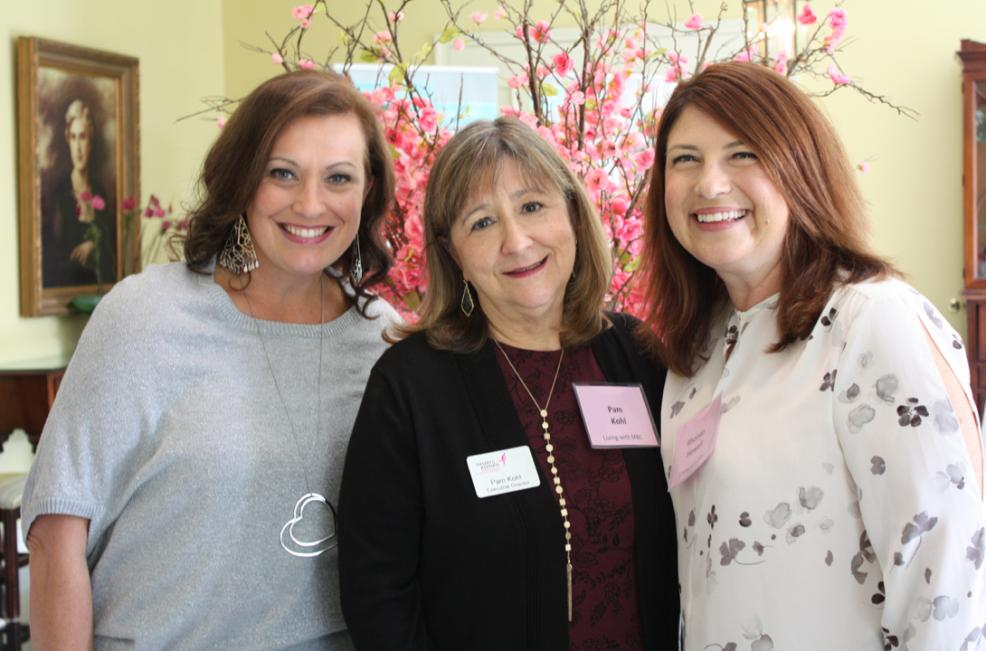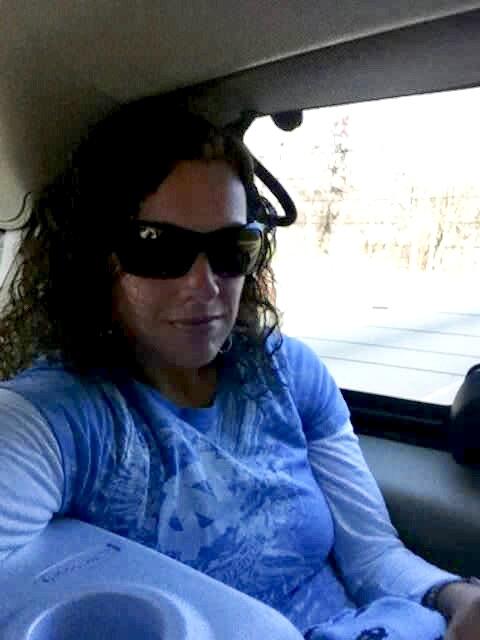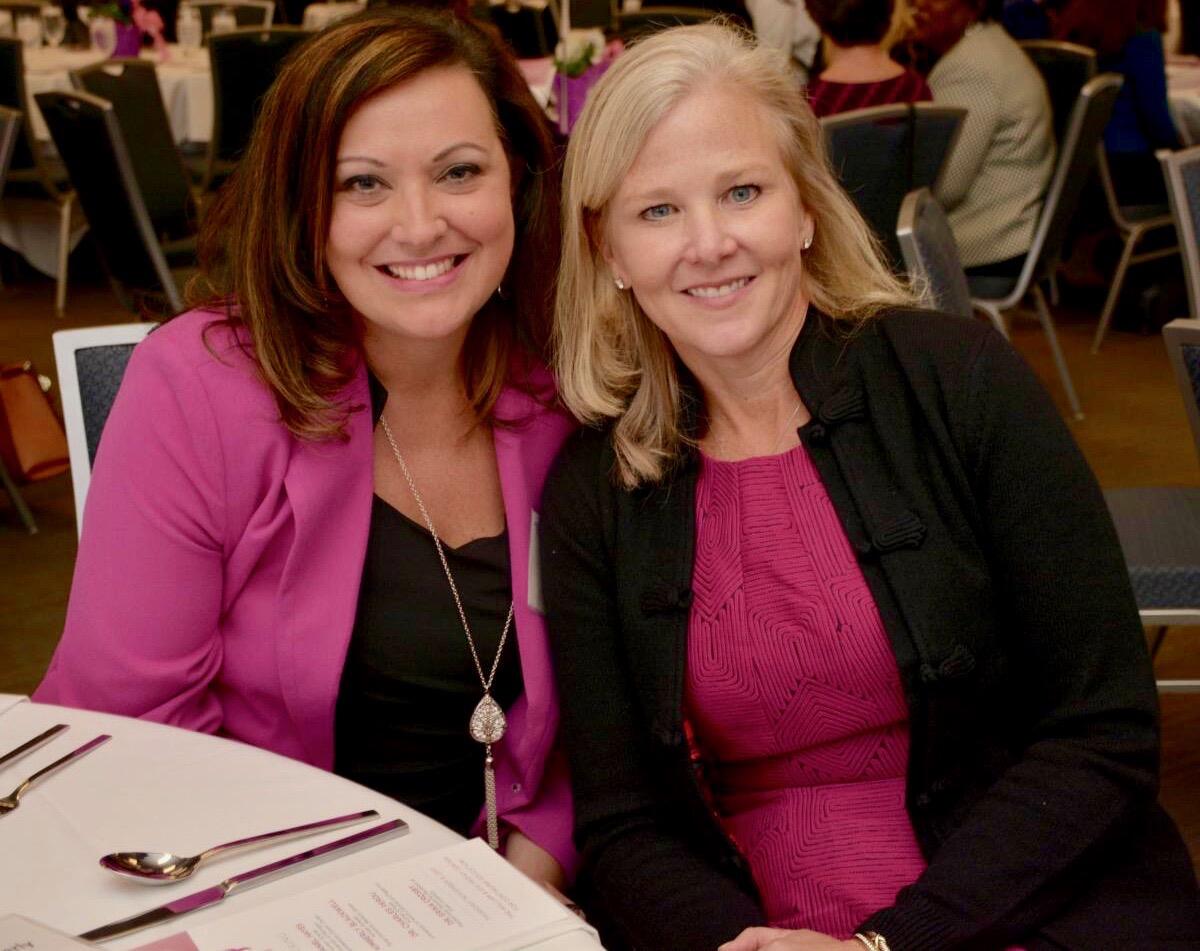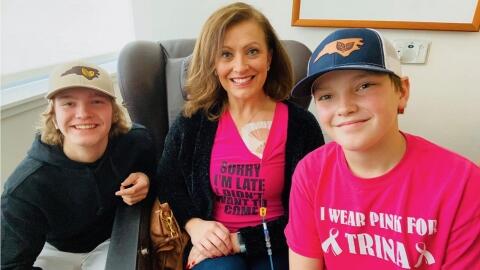Katrina Cooke has beaten the odds; surviving nearly nine years with metastatic breast cancer. Giving her time to make things better for others has been her lifeline.

Alone in the Middle with the Notorious MBC
Published
 From the Duke Cancer Institute archives. Content may be out of date.
From the Duke Cancer Institute archives. Content may be out of date.
Katrina Cooke stepped up to the podium in the brightly lit hotel ballroom. She looked across the sea of pink, locking eyes with the women living with metastatic breast cancer and the physicians and scientists committed to finding ways to help them survive.
“When I was diagnosed at the age of 36, I was a single mom who had just gone through a separation with her husband. I had two young kids and no idea what I was doing, and I knew no one with breast cancer. And definitely no one with metastatic breast cancer. That is a lonely, lonely feeling,” Cooke began. “I would describe it as being all alone in the middle. It’s like standing in the middle of the room surrounded by people you love all reaching out to hug you and give you a hand and support you, love you, and you are standing there screaming as loud as you can and nobody can hear you. Because they just don’t get it.”
The clinking of forks on fruit plates stopped. Many heads nodded. They got it.
Cooke was addressing the “Young Researchers Roundtable Breakfast: Hearing the Metastatic Voice” a Susan G. Komen North Carolina Triangle to the Coast (Komen NCTC) forum, held Oct. 4 last year, an opportunity for those living with metastatic breast cancer to learn from each other, and engage directly with local cancer researchers and providers about the latest treatment advances and promising studies.
In breast cancer, especially in October — Breast Cancer Awareness Month — there’s traditionally a lot of media attention given to risk assessment, early detection, and screening. Understandably so. According to the American Cancer Society/SEER Database, the five-year relative survival rate when cancer is limited to the breast at diagnosis is 99% and 86% when it’s spread regionally. But when breast cancer is metastatic at diagnosis — spread to distant sites of the body like the lungs, liver, bones and brain — the five-year relative survival rate drops to 27 percent.
With better treatments, more and more women and men are living with metastatic breast cancer (MBC) and for longer. Age, overall health, how well a person’s cancer responds to treatment, tumor grade, the presence of hormone receptors, HER2 status, and other factors can affect prognosis, though there’s still no cure.
Chasing Zebras

When Cooke was diagnosed, she was already metastatic. She was younger than the age when women of *average risk, with no family history, are generally advised to begin screening.
She didn’t imagine that what she thought was a pulled muscle in her chest would be anything else.
“We were tail-gating and I was sitting in the trunk of my brother-in-law’s car with my arm on the cooler and the car jerked and the cooler slid into my armpit and I felt like I couldn’t breathe. It just hurt so bad,” shared Cooke, who thought that the bump had aggravated a running injury.
When the pain didn’t subside three days later, Cooke called her primary care physician's office in Greensboro, North Carolina. The only openings were with a new doctor in the practice.
“It was her first day of her first real job as a doctor. I was probably her third patient. She did a very thorough exam and felt enlarged lymph nodes in my armpit and asked me all the questions that your lymph nodes could be enlarged for, like ‘Are you sick?’ etc. It was a no to all of them,” said Cooke.
The doctor’s working theory was that Cooke had an infection somewhere.
“She left the room to write the antibiotics prescription, but when she came back she said, ‘You are going to think I’m crazy and so will anyone else if they hear this. Here’s a prescription for antibiotics and you can start taking them, but next Monday, December 5, I want you to go get an axillary ultrasound. I want to confirm that these lymph nodes in your arm are just an infection. Please don’t cancel the appointment,’” continued Cooke. “She told me that in medical school they tell you over and over and over, ‘If you hear hoofs it’s a horse, don’t go chasing zebras.’”
Here it was, her doctor’s first real day on the job, and she was already chasing a zebra.
Cooke kept her appointment as instructed. The technicians insisted on a mammogram from multiple angles before the ultrasound, which was then followed by a biopsy.
They asked her to return the following day, Dec. 6, 2011, to go over the results. She brought her sister Kim Nolte (a physician assistant with Duke Cancer Institute's Gynecologic Cancer program) with her.
“I know a biopsy is to check for cancer, but it didn’t cross my mind that it could be anything. I had no family history,” said Cooke. “When I was leaving, the ultrasound technician grabbed my shoulder and said, ‘I’m going to pray for you tonight,’ and still it didn’t sink in. I wasn’t worried at all. I was super healthy. I was in the best shape I’d ever been. I ran. I ate well all the time. I was really healthy. There was nothing going on that would have triggered me to be worried about something like that. So, I was shocked when I went in the next day and she said it was breast cancer.”
Cooke was referred to breast oncologist Kimberly Blackwell, MD, at Duke Cancer Institute. In addition to a small tumor in Cooke’s right breast, there was breast cancer in her chest, chest wall, axillary (underarm) and collar bone lymph nodes, in her neck, and in the lymph nodes around her liver. The diagnosis, after testing, was triple positive breast cancer — estrogen receptor positive (ER+), progesterone receptor positive (PR+) and human epithelial growth factor receptor 2 positive (HER2+) — that had already spread to her lymphatic system.
“All statistics I could read in 2011 showed the average lifespan of a person with an MBC diagnosis was only 12-24 months!” said Cooke.
Together Blackwell and Cooke formulated a treatment plan: a bilateral mastectomy and the removal of the dozens of cancerous lymph nodes in her chest wall and axillary area followed by radiation targeting her metastases. She also began infusions of trastuzumab (Herceptin) and pertuzumab (Perjeta) — monoclonal antibody targeted therapies that attach themselves to the HER2 proteins on the surface of breast cancer cells and block them from receiving growth signals. Blackwell also added the kinase inhibitor lapatinib (Tykerb), which also targets the HER2 protein, but targets the receptor inside the breast cancer cell, not on the cell surface. The combination was investigational at the time. Perjeta was rarely used and wasn’t FDA-approved until the following year (2012). Tykerb and Herceptin were not approved for use together.
“My amazing oncologist, Dr. Blackwell, was doing research on this drug combination for people just like me. She took a chance on a combination of drugs that were off the beaten path of MBC in 2011. She was smart and knew this would work,” said Cooke.
Cooke was also prescribed two different hormone therapies that limit or stop the ovaries from making estrogen in pre-menopausal women. The drugs pretty quickly triggered early menopause. She was later switched to a hormone therapy for post-menopausal women with HR+/HER2+ MBC.
Cooke had her first clean scans — no evidence of disease — in December 2012.

Her Lifeline
Cooke was already eight months into cancer treatment before she’d met or talked to anyone who had cancer. No one in her friendship circle had any kind of cancer. No one in her family, either, besides her grandparents who had passed away from cancer when they were elderly. Cooke did some research and found an under-40 cancer support group and an above-40 group. She thought she’d fit in and relate more to the over-40s “because they were bound to be sicker.”
“I went for the first time to this older group. Here I am, 36, walking into this group and the average age was probably about 70. And I walked in and they were like, ‘What are you doing here?’” recalled Cooke. “I was so uncomfortable, and they basically said, ‘You can’t come back to this group.’ The coordinator said, ‘You can come to the 40-and-under group, but when you get to the point that you talk about yourself, I’m going to need you to really dial it down. Don’t talk a lot about metastatic at all, kind of don’t use those words, just be super careful about how you talk about it.’ I was like ‘crap.’ But I went to that (under-40) group, and we all went around and introduced ourselves and I didn’t use the words stage 4 or metastatic.”
It wasn’t until a few months later, when another woman with metastatic cancer joined, that Cooke was able to finally talk openly with another survivor about her diagnosis. That patient would also be her first "metastatic loss."
Cooke decided to stop dumbing down her own disease and become more vocal.
“I thought, ‘You can’t keep me out again.’”
Cooke had learned she had cancer about the same time as she was laid off from her job as a lumber salesperson — smack in the middle of the housing market tank. By the time the economy recovered enough for her company to hire her back, she was too sick to return and her doctor recommended against it.
She went on social security disability believing, like the government, it would be short term.
“They’re banking on you surviving less than 12 months,” said Cooke, who’s already beat that estimate by nearly eight years. “In that time, I’ve been able to do a lot of things that I wouldn’t have been able to do and spend time with my kids that I wouldn’t ever have been able to spend.”
When she was diagnosed, her two boys were three and six. Now they’re 12 and 14.
In addition to spending more time with family, she’s used that “extra time” to become a professional speaker, peer mentor, and advocate, with the goal of “making a difference in as many lives as possible.”
Building on her bachelor’s degree in psychology, Cooke underwent training with the American Cancer Society to become a peer mentor and training with SHARE Cancer Support to become a peer group facilitator.
In 2017, she joined the Duke Cancer Institute Oncology Patient and Family Advisory Council (OPAC), a volunteer program that gives Duke cancer patients and their caregivers an opportunity to provide their perspective on the patient experience and offer recommendations on how to enhance that experience. Since 2018, she’s served as community co-chair of the group. She also sits on OPAC’s chemo-immunotherapy education committee.
“I joined OPAC because I wanted to do whatever I could to make life a little easier for people just like me that chose DCI,” said Cooke. “In partnership with DCI senior leadership, we make sure that we’re working on initiatives that will help improve patient experience at DCI. It could be as simple as the language in forms or brochures to patient messaging with COVID-19 and cancer. I love the passion in the group and I enjoy giving back whenever I possibly can.”
In the fall of 2019, Cooke launched, in partnership with Komen NCTC, the first peer support group for metastatic breast cancer patients in the local area. She didn’t want to allow another metastatic breast cancer survivor to feel the loneliness she felt with her diagnosis.
“For as long as I can, as long as I’m able, for as many people that I can, I want to be the hand they grab for a moment — even if it’s just for 15 minutes — that makes them realize they are not by themselves, that others are traveling this road, that I understand their feelings,” explained Cooke. “I hate the term ‘I know exactly how you feel,’ but I get it. I get the fears and the worries and the concerns. It makes a difference when you have people around that get it.”
“She inspires us every single day,” said Pam Kohl, founder and director of the Komen NCTC Metastatic Breast Cancer Collaborative Research Initiative, which brings together top cancer scientists from DCI and UNC Lineberger Comprehensive Cancer Center. “I remember we met at the governor’s mansion at a tea for people with metastatic breast cancer and their caregivers. I had just been diagnosed metastatic three months previous and could barely say the words much less understand what I was getting ready to face. I met Katrina and she was five years at that point and that was not a hope I was given in terms of what the average life expectancy was going to be. Katrina was my lifeline.”
In Limbo

Cooke credits Blackwell’s “cutting edge” treatment plan, the anti-cancer drugs she’s continued to take without interruption, and regular surveillance by her current DCI medical oncologist P. Kelly Marcom, MD, for remaining stable for 8.5 years and beating the odds of survival — “an incredible and exceptional thing.”
“There have been some very, very difficult bumps in my journey from anaphylactic reactions to acute hypophosphatemia attacks that should have been fatal, and other pretty scary moments,” Cooke shared.
She’s completed more than 150 drug infusions, taken approximately 9,500 chemotherapy pills, and had “too many scans to count.” Over the course of her disease, she’s had a bilateral mastectomy, right side radical, 54 days of radiation, reconstruction surgery, and, most recently, a hysterectomy and an oophorectomy.
“Because of my hormone driven cancer, Dr. Blackwell had always told me that when I beat the odds and lived until the age of 42, she wanted my ovaries and uterus out, so in 2019 I had that surgery,” Cooke explained.
In June of 2020, a spot was found on her rib. Bone can be tricky to biopsy, making bone metastasis difficult to confirm.
“I am working closely with Dr. Alan Sag, a Duke interventional radiologist, to address what we believe is bone metastasis,” said Cooke, who explained that the plan was for Sag to perform a biopsy with cryoablation, but it didn’t work out — Sag stopped after the biopsy due to safety concerns at that session. “On October 14, 2020, I’m (re) scheduled for a cryoablation procedure with Dr. Sag. He is brilliant and trustworthy and this makes working with him very easy. He has one of the best bedside manners of any doctor I have ever had. After the cryoablation and biopsy, Dr. Marcom and Dr. Sag will work together to determine next steps.”
After the cryoablation and biopsy, Dr. Marcom and Dr. Sag will work together to determine next steps.”
Bone metastasis is painful and notoriously difficult to treat. A CT-guided cryoablation, whereby a frozen probe is inserted into the biopsy site (immediately after the CT-guided biopsy) to shatter the tumor cells and tear apart tumor DNA, is one less-invasive treatment option.
The Thanksgiving holiday and Christmas are right around the corner. It’s Cooke’s favorite time of year. All throughout her illness, she didn’t miss a single Macy’s Thanksgiving Day Parade, a single Black Friday all-nighter family shopping ritual, or a single Christmas Eve dinner or “humongous Christmas morning breakfast” at her parents’ house.
“On Black Friday my Christmas shopping is done, my house is decorated on the outside and we get a live tree. I looooooooove Christmas,” said Cooke. “In 2011, I actually came back from Black Friday shopping, for radiation, and then went back out that same day.”
It’s bound to be different this year with concerns over exposure to COVID-19 and her evolving cancer situation. Her life is on the line.
“Research is the only thing that will keep me alive,” said Cooke. “Eventually, I will run out of options and that will be it. We have to do what it takes to save my life. My boys need their mom.”



